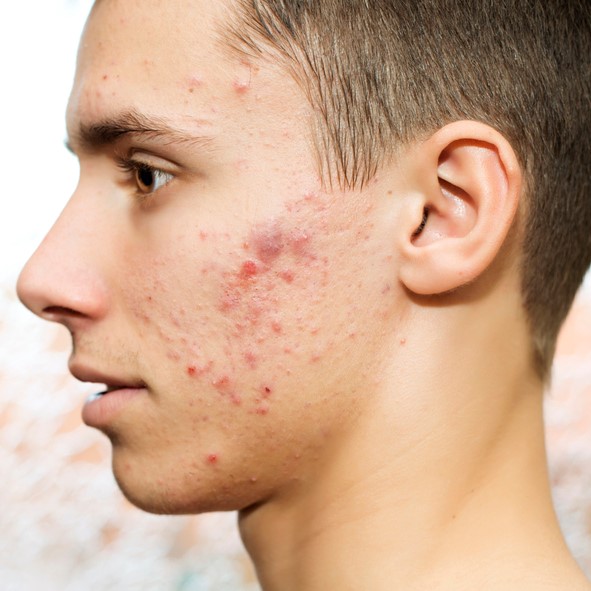Approximately 85% of people experience acne between the ages of 12 and 24. However, if dealing with your acne is making you feel anxious or depressed, we can help!
If your teen is struggling with acne, we understand how frustrating it can be. Coping with acne can affect nearly every aspect of a teen’s life. In fact, the condition can contribute to low self-esteem and poor self-image, often leading to depression and anxiety.

It’s normal for all teenagers to deal with pimples, thanks to the hormonal changes that increase the skin’s amount of oil during puberty. Some teens escape with only mild spots. However, for others, the acne is so severe it can leave them with physical and emotional scars. Therefore, treating acne is often more than just a cosmetic issue.
What is Acne and What Causes It?
Acne is a chronic, inflammatory skin condition that causes whiteheads, blackheads, cysts, pimples, and nodules. It mainly occurs on the face, back, neck, shoulders, and upper arms.
While acne can occur at any age, it most commonly occurs during puberty, when the sebaceous glands activate. The glands produce oil and are stimulated by male hormones produced by the adrenal glands. Approximately 85% of people experience acne between the ages of 12 and 24. However, acne can start as early as nine years of age.
Other factors that contribute to acne include:
- Hormonal changes cause the body to produce more sebum, the oil and fatty acids in the skin’s hair follicles. Common causes of hormonal fluctuations include puberty, hormonal birth control, anabolic steroid use, or stress.
- Bacteria can grow in blocked hair follicles, causing inflammation. Inflamed glands can form pustules, nodules, and cysts.
- Irritation such as picking at existing acne or headgear, hats, or helmets can irritate the skin, which causes more inflammation and can worsen acne.
- Environmental factors such as high levels of humidity or air pollution can contribute to acne.
- Products using greasy/oily lotions or certain hair products like pomades or waxes can block pores and cause acne.
St. Louis Dermatology & Cosmetic Surgery Can Help
There are many suggested home remedies for acne, but not all are supported by research or effective. Below are some of the common treatment options for acne. Your doctor may suggest a combination of these treatments to help achieve the best outcome.
- Benzoyl Peroxide
- Salicylic Acid
- Retinoids
- Antibiotics
- Hormone Therapy
Our Dermatologist can help you explore options to rejuvenate or refine your appearance to help you look and feel your best. We can help you improve your complexion, confidence and achieve younger and healthier-looking skin!
